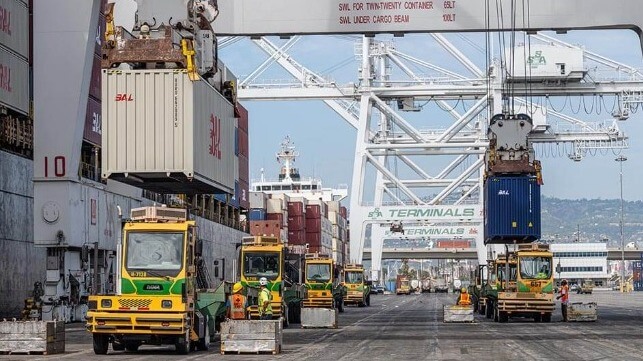Importers Call on Biden to be Involved in Longshore Contract Talks

With the labor agreements for longshore services at West Coast ports due to expire in three weeks, a collation of trade associations is again calling on the Biden administration to “engage in the negotiations to ensure the needs of both the workers and the ports are met and further backups, delays, and inflationary costs are avoided.” Calling for a “swift and timely conclusion,” to the contract negotiations, the associations expressed concern over a recent 10-day pause in the talks saying it is imperative that a final contract is reached that avoids any supply chain disruptions.
“We urge you to encourage both parties to remain at the table until an agreement is finalized because even a relatively brief port slowdown or shutdown would compound current supply chain challenges and cause long-lasting damage to consumer confidence and American businesses,” says the letter jointly signed by the American Apparel & Footwear Association, the Retail Industry Leaders Association, and Travel Goods Association. The letter comes as a follow-up to one sent by a broader industry coalition at the beginning of March also urging President Biden to become involved in the labor negotiations.
Previously when asked about the pending negotiations, U.S. Labor Secretary Marty Walsh told Bloomberg that they would take a similar policy to past administrations waiting and watching the negotiations. They, however, held out the option of becoming involved if “we have to,” saying that they also believed it was critical to avoid further disruption at the ports.
Beyond a settlement of the labor contract, the three organizations also are saying that the Biden administration along with the Pacific Maritime Association and the International Longshore and Warehouse Union should use the contract as an opportunity to “address systemic operational challenges at U.S. ports.” The groups are calling for agreements supporting infrastructure modernization and enabling transparency, data sharing, and interoperability to facilitate end-to-end visibility in the supply chain.
The three organizations said that these important issues must be addressed to strengthen U.S. competitiveness. They also believe that agreements on these issues would ensure the supply chains are fully prepared to support continued economic growth.
Separately, the National Retail Federation released today its monthly forecast for retail import volumes at the U.S.’s container ports. “We’re in for a busy summer at the ports,” said NRF Vice President for Supply Chain and Customs Policy Jonathan Gold. “Back-to-school supplies are already arriving, and holiday merchandise will be right behind them.” He too encouraged the parties to “remain at the table until a deal is done,” in the current contract negotiations.
The NRF said that retail imports in the first six months of 2022 are expected to be up more than five percent year-over-year to a total of 13.5 million TEU. They forecast that June will also be up 7.5 percent to reach 2.31 million TEU, which would mean that May and June tied for the third-highest volume in TEU. The NRF expects without labor disruptions that July would also be up five percent and that the period from August through October while being comparable to the year-ago levels would total more than 2.1 million TEU each month.
Observers of the labor negotiations have said it is becoming increasingly unlikely that they would be a contract agreement before the July 1 expiration. All sides are hopeful that there would not be major interruptions at the ports but they point to past contract negotiations that saw sporadic labor actions after the contracts expired.
